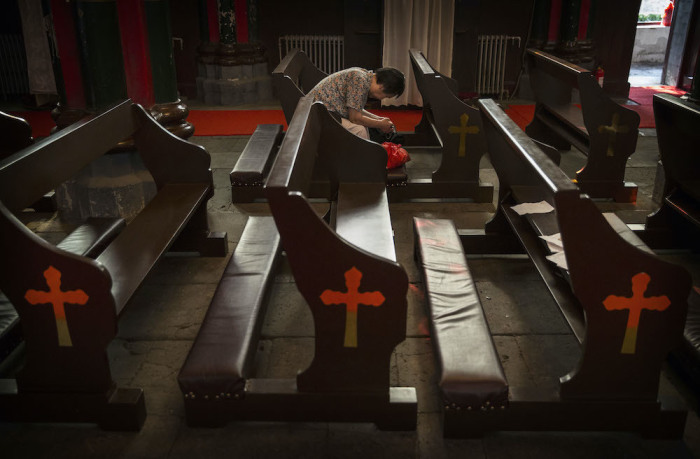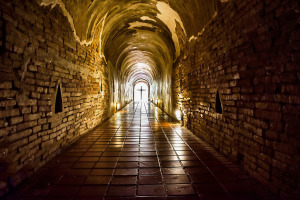China ‘escalated persecution’ against Christian churches in 2022, watchdog warns

The Chinese Communist Party intensified persecution of churches and Christians across mainland China leading up to the 20th Party Congress in 2022, with more house church leaders facing "fraud" charges and stricter censorship of online religious content, a human rights watchdog organization reports.
ChinaAid, which documents religious persecution in China and supports Chinese prisoners of conscience, released its annual persecution report for 2022 last week. The United States-based non-governmental organization warned of an increase in "fraud" charges against house church pastors and leaders in mainland China.
These charges alleged that the traditional practice of tithing and offerings in churches was illegal.
The report states authorities used the "Measures for the Financial Management of Religious Activity Venues" updated last June to fabricate charges against house churches.
Several house church pastors and elders in China were sent to jail, including Pastor Hao Zhiwei from Ezhou House Church in Hubei province, who was sentenced to eight years in prison. Elder Hao Ming and Elder Wu Jiannan of Qingcaodi Church in Sichuan province face potential sentencing of up to 10 years in prison as their case rests in Jinyang District Court.
China only recognizes five religious groups that submit to the government's influence. Christians from unregistered churches bear the brunt of the persecution.
"We are gravely concerned about how the Communist regime also treats the State-sanctioned church," ChinaAid's President and Founder Bob Fu said in a statement. "Previously, they asked for sole allegiance to the Communist Party, but since the 20th National Party Congress, they shifted their emphasis to aligning with Xi Jinping."
"Their goal," he added, "is not only to curate a 'socialist-friendly' church; they hope to erase it. The international community needs to know about these trends and developments as China continues to rise on the global stage."
The communist party remained focused on religious Sinicization.
"Before, during, and after the opening of the Congress, China's state-run religious groups lavished compliments and praise on Xi with more extravagant words and phrases than China's state-run media, showing that religious Sinicization is evolving from supporting the CCP to worship and allegiance to Xi Jinping," the report added.
The Chinese government also implemented strict regulations against religious content on the internet, which ChinaAid contends was aimed at "removing Christianity from cyberspace." The group stresses that Christians have faced "unprecedented" online censorship since the implementation of the "Administrative Measures for Internet Religious Information and Services" in 2022.
Among the victims of the increased online regulation was a 21-year-old website named "Jonah Home," which was shut down in early May, according to the report.
Additionally, the report states that China's first Catholic phone app, "CathAssist," which began in 2013, was forced to stop operating after the implementation of the new measures on internet regulation. According to ChinaAid, the website applied for a service license but "did not meet the government's requirements for the license, despite having taken various
actions including suspending sharing, changing its name, and modifying content."
WeChat group chats also experienced increased censorship of Christian content.
"In 2022, WeChat also applied stricter text filtering to group chats. For example, the two Chinese words (meaning intercessory prayers) had to be typed separately ... to circumvent
censorship checks," the report states. "The names of WeChat group chats also had to be modified, and chat admins had to reduce the use of words related to the Christian faith or even remove Christian content for the survival or maintenance of their group chats."
Christian professionals faced repercussions, including one Christian being denied access to Alibaba's career network platform DingTalk for a year for sharing religious messages.
Authorities also reportedly shut down Shanghai Ziguang Presbyterian Church as well as its website and social media accounts.
In the case of Church of the Rock in Ningxia Hui Autonomous Region and evangelist Geng Zejun, ChinaAid found it "extremely confusing and unusual" that the court's punishment exceeded the prosecution's suggestion when he was sentenced to 15 months and his co-defendants six months for organizing illegal religious gatherings.
"This is extremely confusing and unusual because it was unheard of by ChinaAid in its (six) years of collection of persecution cases in mainland China that the court's sentence exceeds in severity the punishment suggested by the prosecutor," the report commented.
Additionally, Taiyuan Zion Reformed Church was raided in April, and seven defendants were sentenced to a fine on top of a prison term.
In addition to raiding and disrupting regular church gatherings, authorities also harassed Christians during events such as baptism, online prayer meetings and special church functions.
Due to the increased persecution, churches and Christians became more apprehensive about sharing their personal experiences of persecution with the outside world, ChinaAid said.
The CCP also targeted college students, limiting their religious activities on the grounds of COVID-prevention efforts. Officials asked education departments to screen and investigate students' religious beliefs, the report warns.
China is ranked No. 16 on Open Doors' 2023 World Watch List of the countries where it's most difficult to be a Christian.
"New restrictions on internet and social media – together with the 2018 regulations on religion, which continue to be revised – are putting severe limitations on Christian freedom," Open Doors warns in a fact sheet. "Many churches are being monitored and closed, no matter whether they are independent or belong to the Three-Self Patriotic Movement. It remains illegal for under-18s to attend church. The old idea that churches will only be perceived as being a threat if they become too large, too political or invite foreign guests is now an unreliable guideline."





























